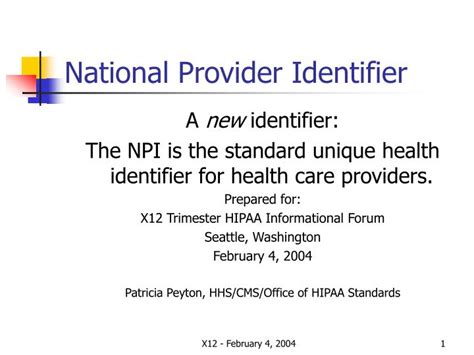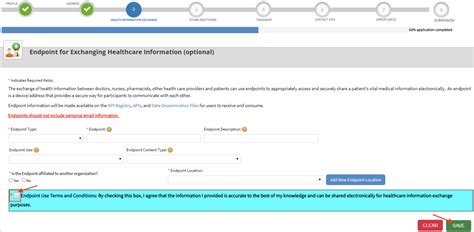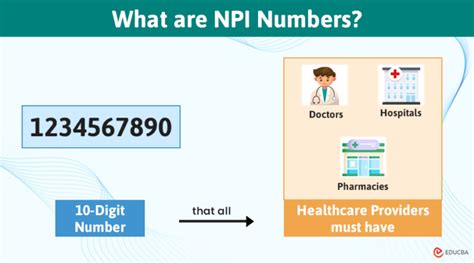Intro
Discover the significance of a National Provider Identifier (NPI) number in the US healthcare system. Learn what an NPI is, its purpose, and how it differs from other identifiers like UPIN and PIN. Understand the importance of NPI in medical billing, HIPAA compliance, and patient data security. Get the inside scoop on NPI numbers and their role in modern healthcare.
The National Provider Identifier (NPI) number is a unique identification number assigned to healthcare providers, organizations, and other entities that provide healthcare services. The NPI number is a standardized way to identify healthcare providers and is used to facilitate the efficient processing of healthcare claims, coordinate care, and improve the overall quality of healthcare services.

The NPI number is a 10-digit number that is assigned to healthcare providers by the Centers for Medicare and Medicaid Services (CMS). The NPI number is required for all healthcare providers who bill Medicare, Medicaid, or other government-funded healthcare programs. In addition, many private insurance companies also require healthcare providers to have an NPI number in order to process claims.
Why Do Healthcare Providers Need an NPI Number?
Healthcare providers need an NPI number for several reasons:
- Unique Identification: The NPI number provides a unique identifier for healthcare providers, which helps to prevent confusion and errors in the processing of healthcare claims.
- Streamlined Claims Processing: The NPI number helps to streamline the claims processing process by providing a standardized way to identify healthcare providers.
- Improved Care Coordination: The NPI number helps to improve care coordination by providing a way to track patient care across different healthcare providers and settings.
- Reduced Administrative Burden: The NPI number helps to reduce the administrative burden on healthcare providers by providing a standardized way to identify providers and process claims.
Types of NPI Numbers
There are two types of NPI numbers:
- Type 1 NPI: A Type 1 NPI is assigned to individual healthcare providers, such as physicians, nurses, and other healthcare professionals.
- Type 2 NPI: A Type 2 NPI is assigned to organizations, such as hospitals, clinics, and group practices.
How to Apply for an NPI Number
Healthcare providers can apply for an NPI number through the CMS website. The application process typically takes a few days to a few weeks, depending on the complexity of the application. To apply for an NPI number, healthcare providers will need to provide the following information:
- Name and Address: The name and address of the healthcare provider or organization.
- Taxpayer Identification Number: The taxpayer identification number (TIN) of the healthcare provider or organization.
- Social Security Number: The social security number of the individual healthcare provider (for Type 1 NPI applications).
- Business Structure: The business structure of the healthcare provider or organization (e.g. sole proprietorship, partnership, corporation).

NPI Number Format
The NPI number format is a 10-digit number that is typically formatted as follows:
- First 3 digits: The first three digits of the NPI number are the "issuer" code, which identifies the entity that assigned the NPI number.
- Next 2 digits: The next two digits of the NPI number are the "type" code, which identifies the type of healthcare provider or organization.
- Last 5 digits: The last five digits of the NPI number are the "identifier" code, which is a unique identifier for the healthcare provider or organization.
Benefits of Having an NPI Number
Having an NPI number provides several benefits to healthcare providers, including:
- Improved Claims Processing: The NPI number helps to streamline the claims processing process, reducing errors and delays.
- Increased Efficiency: The NPI number helps to increase efficiency by providing a standardized way to identify healthcare providers and process claims.
- Better Care Coordination: The NPI number helps to improve care coordination by providing a way to track patient care across different healthcare providers and settings.
- Reduced Administrative Burden: The NPI number helps to reduce the administrative burden on healthcare providers by providing a standardized way to identify providers and process claims.

Common Mistakes to Avoid When Applying for an NPI Number
When applying for an NPI number, healthcare providers should avoid the following common mistakes:
- Inaccurate Information: Providing inaccurate information on the application can delay or reject the application.
- Incomplete Application: Failing to complete the application can delay or reject the application.
- Incorrect Business Structure: Identifying the incorrect business structure can delay or reject the application.
- Failure to Update Information: Failing to update information can result in errors or delays in claims processing.
NPI Number Lookup
Healthcare providers can look up their NPI number on the CMS website. The NPI number lookup tool allows healthcare providers to verify their NPI number and ensure that it is accurate and up-to-date.
Conclusion
In conclusion, the National Provider Identifier (NPI) number is a unique identification number assigned to healthcare providers, organizations, and other entities that provide healthcare services. The NPI number is required for all healthcare providers who bill Medicare, Medicaid, or other government-funded healthcare programs. Having an NPI number provides several benefits, including improved claims processing, increased efficiency, better care coordination, and reduced administrative burden. Healthcare providers should avoid common mistakes when applying for an NPI number and ensure that their information is accurate and up-to-date.

We encourage you to share your thoughts and experiences with NPI numbers in the comments section below. If you have any questions or concerns, please don't hesitate to ask.
What is an NPI number?
+An NPI number is a unique identification number assigned to healthcare providers, organizations, and other entities that provide healthcare services.
Who needs an NPI number?
+All healthcare providers who bill Medicare, Medicaid, or other government-funded healthcare programs need an NPI number.
How do I apply for an NPI number?
+Healthcare providers can apply for an NPI number through the CMS website.
